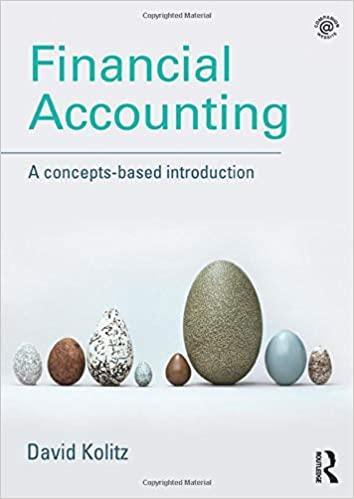Part 5: Need help with [Para 7b-16], [Para 7b-17a], [Para 7b-17b], and [Para 7b-17c]
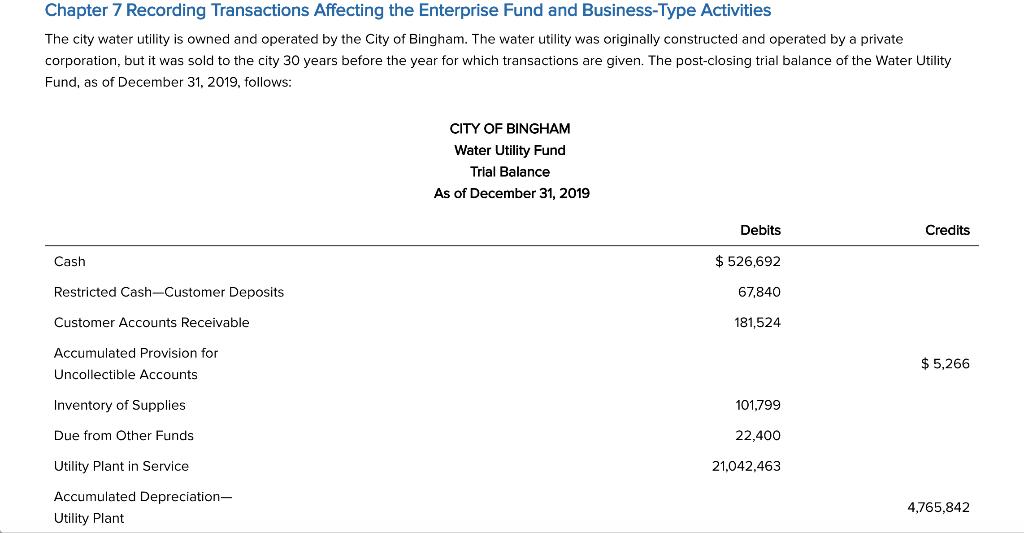
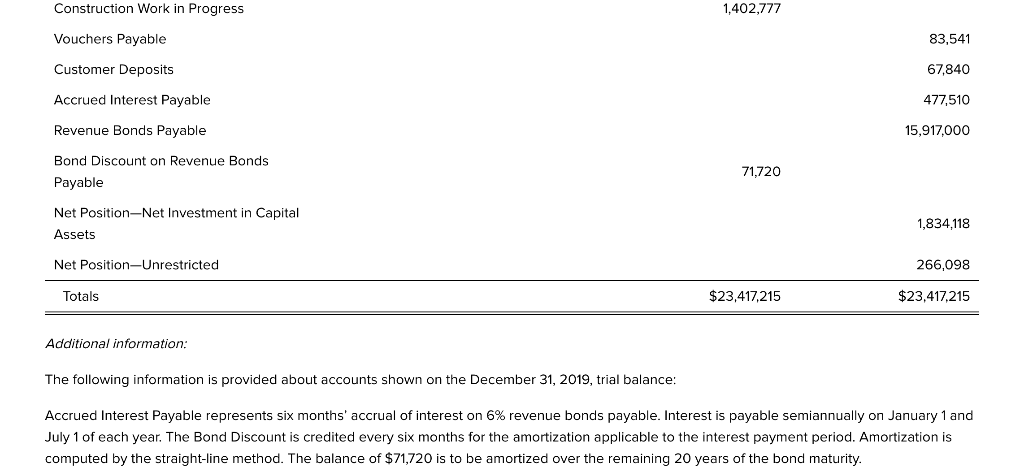

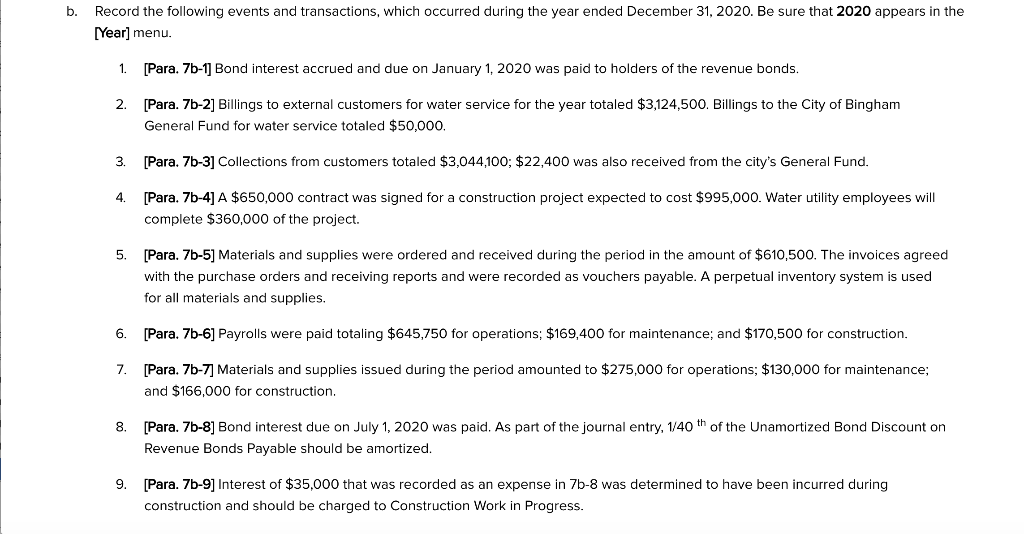
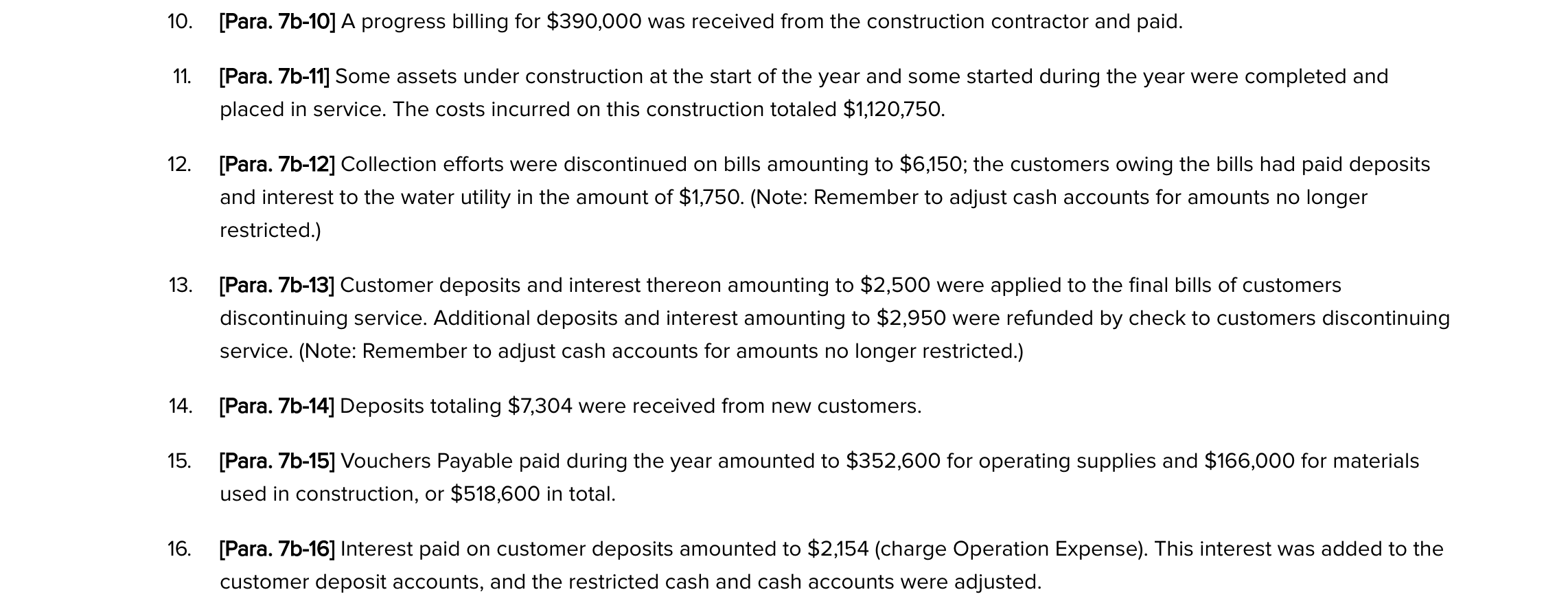
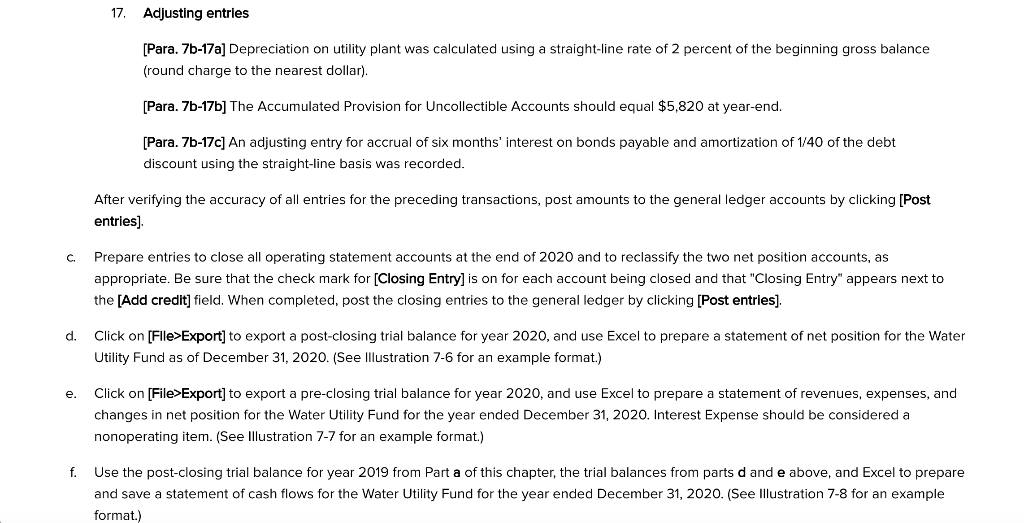
Chapter 7 Recording Transactions Affecting the Enterprise Fund and Business-Type Activities The city water utility is owned and operated by the City of Bingham. The water utility was originally constructed and operated by a private corporation, but it was sold to the city 30 years before the year for which transactions are given. The post-closing trial balance of the Water Utility Fund, as of December 31, 2019, follows: CITY OF BINGHAM Water Utility Fund Trial Balance As of December 31, 2019 Debits Credits Cash $ 526,692 Restricted Cash-Customer Deposits 67,840 Customer Accounts Receivable 181,524 Accumulated Provision for Uncollectible Accounts $ 5,266 Inventory of Supplies 101,799 Due from Other Funds 22,400 Utility Plant in Service 21,042,463 Accumulated Depreciation- Utility Plant 4,765,842 Construction Work in Progress 1,402,777 Vouchers Payable 83,541 Customer Deposits 67,840 Accrued Interest Payable 477,510 Revenue Bonds Payable 15,917,000 Bond Discount on Revenue Bonds Payable 71,720 Net Position-Net Investment in Capital Assets 1,834,118 Net Position-Unrestricted 266,098 Totals $23,417,215 $23.417.215 Additional information: The following information is provided about accounts shown on the December 31, 2019, trial balance: Accrued Interest Payable represents six months' accrual of interest on 6% revenue bonds payable. Interest is payable semiannually on January 1 and July 1 of each year. The Bond Discount is credited every six months for the amortization applicable to the interest payment period. Amortization is computed by the straight-line method. The balance of $71,720 is to be amortized over the remaining 20 years of the bond maturity. Required a. Open a general journal as of December 31, 2019 for the Water Utility Fund by entering each of the accounts and amounts shown in the above post-closing trial balance. Enter 2019 from the dropdown [Year] menu. Each of the account titles will be found in the drop down [Account] menu in the [Journal] view of the program. Be sure to enter 7a as your paragraph number in the [Add description] field and enter the appropriate paragraph number for all subsequent journal entries. Verify the accuracy of your journal entry and post it to the general ledger by clicking [Post entries]. Unless your instructor specifies electronic submission, print a post-closing trial balance as of December 31, 2019, and retain it in your cumulative file until directed by your instructor to submit it. Entries in this enterprise fund do not have to be recorded at the government-wide level since enterprise funds and business-type activities at the government-wide level both use the same (accrual) basis of accounting and same (economic resources) measurement focus. Thus, the same information recorded in the accounts of the enterprise fund can also, with only slight modification, be reported as business-type activities at the government-wide level. b. Record the following events and transactions, which occurred during the year ended December 31, 2020. Be sure that 2020 appears in the [Year] menu. 1. [Para. 7b-1] Bond interest accrued and due on January 1, 2020 was paid to holders of the revenue bonds. 2. [Para. 7b-2] Billings to external customers for water service for the year totaled $3,124,500. Billings to the City of Bingham General Fund for water service totaled $50,000 3. [Para. 7b-3] Collections from customers totaled $3,044,100; $22,400 was also received from the city's General Fund. 4. (Para. 7b-40 A $650,000 contract was signed for a construction project expected to cost $995,000. Water utility employees will complete $360,000 of the project. 5. [Para. 76-5] Materials and supplies were ordered and received during the period in the amount of $610,500. The invoices agreed with the purchase orders and receiving reports and were recorded as vouchers payable. A perpetual inventory system is used for all materials and supplies. 6. [Para. 7b-6] Payrolls were paid totaling $645,750 for operations: $169,400 for maintenance; and $170,500 for construction. 7. [Para. 7b-7] Materials and supplies issued during the period amounted to $275,000 for operations; $130,000 for maintenance; and $166,000 for construction. 8. [Para. 76-8] Bond interest due on July 1, 2020 was paid. As part of the journal entry, 1/40 th of the Unamortized Bond Discount on Revenue Bonds Payable should be amortized. 9. [Para. 7b-9] Interest of $35,000 that was recorded as an expense in 7b-8 was determined to have been incurred during construction and should be charged to Construction Work in Progress. 10. [Para. 7b-10] A progress billing for $390,000 was received from the construction contractor and paid. 11. [Para. 7b-11] Some assets under construction at the start of the year and some started during the year were completed and placed in service. The costs incurred on this construction totaled $1,120,750. 12. [Para. 7b-12] Collection efforts were discontinued on bills amounting to $6,150; the customers owing the bills had paid deposits and interest to the water utility in the amount of $1,750. (Note: Remember to adjust cash accounts for amounts no longer restricted.) 13. [Para. 7b-13] Customer deposits and interest thereon amounting to $2,500 were applied to the final bills of customers discontinuing service. Additional deposits and interest amounting to $2,950 were refunded by check to customers discontinuing service. (Note: Remember to adjust cash accounts for amounts no longer restricted.) 14. [Para. 7b-14] Deposits totaling $7,304 were received from new customers. 15. [Para. 7b-15] Vouchers Payable paid during the year amounted to $352,600 for operating supplies and $166,000 for materials used in construction, or $518,600 in total. 16. [Para. 7b-16] Interest paid on customer deposits amounted to $2,154 (charge Operation Expense). This interest was added to the customer deposit accounts, and the restricted cash and cash accounts were adjusted. 17. Adjusting entries [Para. 7b-17a] Depreciation on utility plant was calculated using a straight-line rate of 2 percent of the beginning gross balance (round charge to the nearest dollar). [Para. 7b-17b] The Accumulated Provision for Uncollectible Accounts should equal $5,820 at year-end. [Para. 7b-17c] An adjusting entry for accrual of six months' interest on bonds payable and amortization of 1/40 of the debt discount using the straight-line basis was recorded. After verifying the accuracy of all entries for the preceding transactions, post amounts to the general ledger accounts by clicking [Post entries] c. Prepare entries to close all operating statement accounts at the end of 2020 and to reclassify the two net position accounts, as appropriate. Be sure that the check mark for [Closing Entry] is on for each account being closed and that "Closing Entry" appears next to the [Add credit field. When completed, post the closing entries to the general ledger by clicking (Post entries) d. Click on [File>Export] to export a post-closing trial balance for year 2020, and use Excel to prepare a statement of net position for the Water Utility Fund as of December 31, 2020. (See Illustration 7-6 for an example format.) Click on [File>Export] to export a pre-closing trial balance for year 2020, and use Excel to prepare a statement of revenues, expenses, and changes in net position for the Water Utility Fund for the year ended December 31, 2020. Interest Expense should be considered a nonoperating item. (See Illustration 7-7 for an example format.) f. Use the post-closing trial balance for year 2019 from Part a of this chapter, the trial balances from parts d and e above, and Excel to prepare and save a statement of cash flows for the Water Utility Fund for the year ended December 31, 2020. (See Illustration 7-8 for an example format.) Chapter 7 Recording Transactions Affecting the Enterprise Fund and Business-Type Activities The city water utility is owned and operated by the City of Bingham. The water utility was originally constructed and operated by a private corporation, but it was sold to the city 30 years before the year for which transactions are given. The post-closing trial balance of the Water Utility Fund, as of December 31, 2019, follows: CITY OF BINGHAM Water Utility Fund Trial Balance As of December 31, 2019 Debits Credits Cash $ 526,692 Restricted Cash-Customer Deposits 67,840 Customer Accounts Receivable 181,524 Accumulated Provision for Uncollectible Accounts $ 5,266 Inventory of Supplies 101,799 Due from Other Funds 22,400 Utility Plant in Service 21,042,463 Accumulated Depreciation- Utility Plant 4,765,842 Construction Work in Progress 1,402,777 Vouchers Payable 83,541 Customer Deposits 67,840 Accrued Interest Payable 477,510 Revenue Bonds Payable 15,917,000 Bond Discount on Revenue Bonds Payable 71,720 Net Position-Net Investment in Capital Assets 1,834,118 Net Position-Unrestricted 266,098 Totals $23,417,215 $23.417.215 Additional information: The following information is provided about accounts shown on the December 31, 2019, trial balance: Accrued Interest Payable represents six months' accrual of interest on 6% revenue bonds payable. Interest is payable semiannually on January 1 and July 1 of each year. The Bond Discount is credited every six months for the amortization applicable to the interest payment period. Amortization is computed by the straight-line method. The balance of $71,720 is to be amortized over the remaining 20 years of the bond maturity. Required a. Open a general journal as of December 31, 2019 for the Water Utility Fund by entering each of the accounts and amounts shown in the above post-closing trial balance. Enter 2019 from the dropdown [Year] menu. Each of the account titles will be found in the drop down [Account] menu in the [Journal] view of the program. Be sure to enter 7a as your paragraph number in the [Add description] field and enter the appropriate paragraph number for all subsequent journal entries. Verify the accuracy of your journal entry and post it to the general ledger by clicking [Post entries]. Unless your instructor specifies electronic submission, print a post-closing trial balance as of December 31, 2019, and retain it in your cumulative file until directed by your instructor to submit it. Entries in this enterprise fund do not have to be recorded at the government-wide level since enterprise funds and business-type activities at the government-wide level both use the same (accrual) basis of accounting and same (economic resources) measurement focus. Thus, the same information recorded in the accounts of the enterprise fund can also, with only slight modification, be reported as business-type activities at the government-wide level. b. Record the following events and transactions, which occurred during the year ended December 31, 2020. Be sure that 2020 appears in the [Year] menu. 1. [Para. 7b-1] Bond interest accrued and due on January 1, 2020 was paid to holders of the revenue bonds. 2. [Para. 7b-2] Billings to external customers for water service for the year totaled $3,124,500. Billings to the City of Bingham General Fund for water service totaled $50,000 3. [Para. 7b-3] Collections from customers totaled $3,044,100; $22,400 was also received from the city's General Fund. 4. (Para. 7b-40 A $650,000 contract was signed for a construction project expected to cost $995,000. Water utility employees will complete $360,000 of the project. 5. [Para. 76-5] Materials and supplies were ordered and received during the period in the amount of $610,500. The invoices agreed with the purchase orders and receiving reports and were recorded as vouchers payable. A perpetual inventory system is used for all materials and supplies. 6. [Para. 7b-6] Payrolls were paid totaling $645,750 for operations: $169,400 for maintenance; and $170,500 for construction. 7. [Para. 7b-7] Materials and supplies issued during the period amounted to $275,000 for operations; $130,000 for maintenance; and $166,000 for construction. 8. [Para. 76-8] Bond interest due on July 1, 2020 was paid. As part of the journal entry, 1/40 th of the Unamortized Bond Discount on Revenue Bonds Payable should be amortized. 9. [Para. 7b-9] Interest of $35,000 that was recorded as an expense in 7b-8 was determined to have been incurred during construction and should be charged to Construction Work in Progress. 10. [Para. 7b-10] A progress billing for $390,000 was received from the construction contractor and paid. 11. [Para. 7b-11] Some assets under construction at the start of the year and some started during the year were completed and placed in service. The costs incurred on this construction totaled $1,120,750. 12. [Para. 7b-12] Collection efforts were discontinued on bills amounting to $6,150; the customers owing the bills had paid deposits and interest to the water utility in the amount of $1,750. (Note: Remember to adjust cash accounts for amounts no longer restricted.) 13. [Para. 7b-13] Customer deposits and interest thereon amounting to $2,500 were applied to the final bills of customers discontinuing service. Additional deposits and interest amounting to $2,950 were refunded by check to customers discontinuing service. (Note: Remember to adjust cash accounts for amounts no longer restricted.) 14. [Para. 7b-14] Deposits totaling $7,304 were received from new customers. 15. [Para. 7b-15] Vouchers Payable paid during the year amounted to $352,600 for operating supplies and $166,000 for materials used in construction, or $518,600 in total. 16. [Para. 7b-16] Interest paid on customer deposits amounted to $2,154 (charge Operation Expense). This interest was added to the customer deposit accounts, and the restricted cash and cash accounts were adjusted. 17. Adjusting entries [Para. 7b-17a] Depreciation on utility plant was calculated using a straight-line rate of 2 percent of the beginning gross balance (round charge to the nearest dollar). [Para. 7b-17b] The Accumulated Provision for Uncollectible Accounts should equal $5,820 at year-end. [Para. 7b-17c] An adjusting entry for accrual of six months' interest on bonds payable and amortization of 1/40 of the debt discount using the straight-line basis was recorded. After verifying the accuracy of all entries for the preceding transactions, post amounts to the general ledger accounts by clicking [Post entries] c. Prepare entries to close all operating statement accounts at the end of 2020 and to reclassify the two net position accounts, as appropriate. Be sure that the check mark for [Closing Entry] is on for each account being closed and that "Closing Entry" appears next to the [Add credit field. When completed, post the closing entries to the general ledger by clicking (Post entries) d. Click on [File>Export] to export a post-closing trial balance for year 2020, and use Excel to prepare a statement of net position for the Water Utility Fund as of December 31, 2020. (See Illustration 7-6 for an example format.) Click on [File>Export] to export a pre-closing trial balance for year 2020, and use Excel to prepare a statement of revenues, expenses, and changes in net position for the Water Utility Fund for the year ended December 31, 2020. Interest Expense should be considered a nonoperating item. (See Illustration 7-7 for an example format.) f. Use the post-closing trial balance for year 2019 from Part a of this chapter, the trial balances from parts d and e above, and Excel to prepare and save a statement of cash flows for the Water Utility Fund for the year ended December 31, 2020. (See Illustration 7-8 for an example format.)












